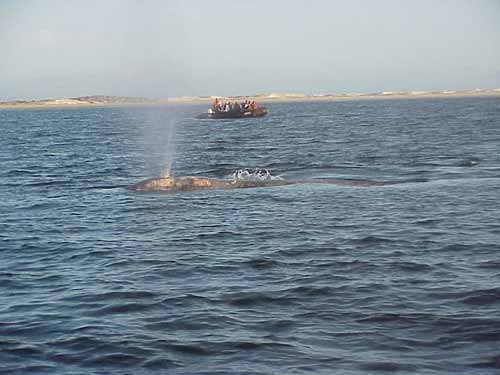Big Books of American Literature: Alchemies of Mind
Day 7: Tuesday, February 7, 2006
Moby-Dick (2nd One Hundred Pages...)

Already we are boldly launched upon the deep;
but soon we shall be lost in its unshored, harborless immensities.
(Chapter 32: Cetology)
I. Coursekeeping:
--sign up for today and last Thursday
--(some!) of your first set of web papers now up
--if yours is not here: maybe you didn't enter your e-mail address, or...?
--advice on direction-following?
--hard copies to return, w/ comments
Anne Dalke puts the ball in my court...the paper does not have the usual purpose: a means to the ends of a grade....the means is the ends. A paper is exactly as good as the amount of worth I get out of it. (Amen.)
also? from discussion following
A View from the Humanities:
are observations motivated by questions?
or questions motivated by observations?
or is it an endlessly recursive loop?
think about (and articulate) what is motivating your paper/this particular paper
also? please number your pages, give page cites within the text
(no footnotes!) and provide a full Works Cited list @ the end
--conferences anytime for this/next papers
--read third quarter of Melville's "anatomy" for Thursday (past p. 300)
II. How was the weekend?
Any (relevant) stories of moods or whales?
Take keynote for today's class from The Vagina Monologues (Sky, Anna, Laine...?)
This matter of the homoerotic

"Ishmael, Queequeg, and Phyester Macrocephales,"from Moby and the Net
How do we read the relationship between Ishmael and Queequeg?
How do you go about making meaning of these early passages...?
I found Queequeg's arm thrown over mine in the most loving and affectionate manner. You have almost thought I had been his wife ...when I was a child, I well remember a somewhat similar circumstance...a supernatural hand seemed placed in mind...nameless, unimaginable, silent form or phantom...seemed closely seated by my bedside (36-37)
...bridegroom clasp...hatchet-faced baby... matrimonial sort of style...henceforth we were married (56)
...there is no place like a bed for confidential disclosures between friends. Man and wife, they say, there open the very bottom of their souls to each other...thus, then, in our hearts' honeymoon, lay I and Queequeg--a cosy, loving pair (57).
Steph: not sure what to make of the relationship between Ishmael and Queequeg. Is it just my 21st century mind that wants to make it homoerotic?
Marina: The relationship between Queequeg and Ishmael did not seem homoerotic or homosexual to me. Waking up with a man's arm wrapped around you seemed to me like it could happen to anyone.
Margaret: I didn't find Queequeg and Ishmael's relationship to be homoerotic, but that could just be me.
Amy:Also? Weighing in- it's TOTALLY homoerotic. Really.
Jess: Yes, I think its homoerotic....I think its okay to read it a little queer. What's the use of that, though, is my question.

"The Marriage of Ishmael and Queequeg," from Moby and the Net
Let's assume, for the moment, that their relationship is homoerotic.
What IS the use of that?
Leslie Fiedler, "Come Back to the Raft Ag'n, Huck Honey," Partisan Review (1948): "It is perhaps to be expected that the Negro and the homosexual should become stock literary themes in a period when the exploration of responsibility and failure has become again a primary concern of our literature." Fiedler developed this theme in Love and Death in the American Novel (1960), which argued that our literature is incapable of dealing with adult sexuality and is pathologically obsessed with death.
Chris (from a paper for Religion 303, Fall 2005): When the reader first encounters Ishmael, he is characterized by his distance, his non-immersion. He is...gazing at the gazer of those gazing at the sea...set apart...standoffish....Queequeg is the ultimate other....when and only when Ishmael shuts his eyes, can he see the truth...Through his allowing himself to touch and abandon simple sight can he truly experience the other....the image of looking out into the water is...a strong image...reminiscent of Narcissus....Ishamel..destroys the original self, and creates a more complete self in connection with Queequeg...."We cannibals must help these Christians" (64)...can be reinterpreted as "we people who understand the power of the redefined compromised individual in order to unite the subject with its object must help those who stand firm in their unwaivering attitude and will therefore never succeed." Of course, this is not nearly as poetic (!).
Let's play the doubting game, and assume, for the moment, that this is a joke.
"It's queer, very queer" (111).
How do you know if a text is being satiric?
(Reprise: exaggeration? repetition?)
Some test cases:
Having impulsively, it is probably, and perhaps somewhat prematurely revealed the prime but private purpose of the Pequod's voyage, Ahab was not conscious that...he had indirectly laid himself open to the unanswerable charge of usurpation ...imputation of usurpation...suppressed impression (178)
Ahab did, in the end, a little respond to the playful allurings of that girlish air. More than once did he put forth the faint blossom of a look....The warmly cool, clear, ringing, perfumed, overflowing, redundant days, were as crystal goblets of Persian sherbet, heaped up--flaked up, with rose-water snow. The starred and stately night seemed haughty dames in jewelled velvets, nursing at home in lonely pride, the memory of their absent conquering Earls, the golden helmeted suns! For sleeping man,'twas hard to choose between such winsome days and such seducing nights...all the witcheries of that unwaning weather.... (Chs. 28-29, p. 110).
Chapter 54--The Town-ho's Story: For my humor's sake, I shall preserve the style in which I once narrated it Lima, to a lounging circle of my Spanish friends... (?!..cf. "Turn of the Screw"?) ....in the morning of the third day from that in which he had been betrayed....but that would be too long a story...."Then I entreat you, tell me if...this your story is in substance really true?....Did you get it from an unquestionable source?"(200, 211, 213)

Chapter 32--Cetology:It is some systematized exhibition of the whale in his broad genera, that I would now fain put before you, yet is it no easy task. The classification of the constituents of a chaos, nothing less is here essayed....I promise nothing complete...simply to project the draught of a systematization of cetology. I am the architect, not the builder....I now leave my cetological System standing thus unfinished, even as the great Cathedral of Cologne was left, with the crane still standing upon the top of the uncompleted tower. For small erections may be finished by their first architects; grand ones, true ones, ever leave the copestone to posterity. God keep me from ever completing anything. This whole book is but a draught--nay, but the draft of a draught. Oh, Time, Strength, Cash, and Patience! ( 115, 125).
Sky: The cetology chapter didn't faze me at all, since he's so academically irreverent about it.
footnote #1, p. 115:
"...a parody of the claims of science to explain the wonders and mysteries of nature."
Is it?
Cf. A View from the Humanities: science is
- "sufficiently humble" not to resort to explanations not justified by the data
- willing to accept that not everything can be explained (right now. ever)
- and so: avoids premature story telling.

"The Spouter Inn Painting, Revealed," from Moby and the Net
As yet...the sperm whale...lives not complete in any literature...
his is an unwritten life (Ch 32, p. 116).
Perhaps this is not a parody.
Perhaps the joke's on us,
for expecting completeness?
III. Let's play a bit with what acknowledging incompleteness--and not telling premature stories--gets us:
Lisa Belkin, "The Odds of That: Coincidence in an Age of Conspiracy,"New York Times Magazine (August 11, 2002) argues that, especially in age when paranoia runs rampant, we are discomforted by idea of random universe. Finding a reason or pattern where there is none makes it less frightening, because it makes it logical. In a "big enough" world, she suggests, one with a "large enough" denominator, patterns will emerge....the Web has changed the scale of things, has given us the technical ability to gather bits and pieces of information. The Internet makes it easier to collect random noise--and then to find chance patterns in it; it has fed a generation of conspiracy theorists who see highly improbable patterns in large data sets....in the era of the Internet... how do we decide what is relevant, what random? How do we decide when the outlier is a key to a new story or pattern not yet seen?
...whaleman is wrapped by influences all tending to make his fancy pregnant with many a mighty birth...eventually invested Moby Dick with new terrors unborrowed from anything that visibly appears (153).
...to any monomaniac man, the veriest trifles capacriciously carry meanings (195).
Cf. my senior thesis (College of William and Mary, 1975): "'Serene, Exasperating Sunlight': An Examination of Nature Imagery in Hawthorne and Melville"
Granting the inevitable incompleteness of our pursuit of knowledge,
what's the wisest course to take?

"Ahab Contagious," from Moby and the Net
IV. Consider Ahab's fixity of purpose:
Chris: "All is Ahab".... there is a very foucaultian enaction of power...without even enforcing them directly.
Ch. 36--The Quarter-Deck: "Hark ye yet again,--the little lower layer. All visible objects, man, are but as pasteboard masks. But in each event--in the living act, the undoubted deed--there, some unknown but still reasoning thing puts forth the mouldings of its features from behind the unreasoning mask. If man will strike, strike through the mask! How can the prisoner reach outside except by thrusting through the wall? To me, the white whale is that wall, shoved near to me. Sometimes I think there's naught beyond. But 'tis enough. He tasks me; he heaps me; I see in him outrageous strength, with an inscrutable malice sinewing it. That inscrutable thing is chiefly what I hate; and be the white whale agent, or be the white whale principal, I will wreak that hate upon him. Talk not to me of blasphemy, man; I'd strike the sun if it insulted me....who's over me? Truth hath no confines...." the ship heaved and rolled as before. Ah, ye admonitions and warnings!....Yet not so much predictions from without, as verifications of the foregoing things within. For with little external to constrain us, the innermost necessities in our being, these still drive us on. (140-141)
We ran out of time...
go now to the on-line forum and gloss this passage.
Return to Syllabus






